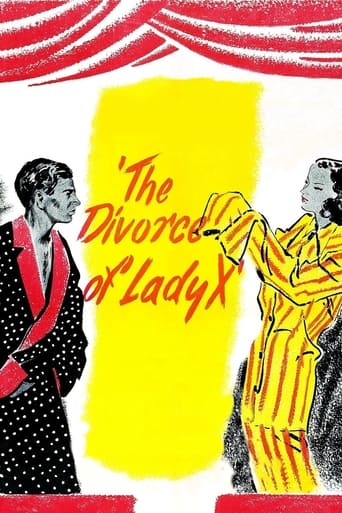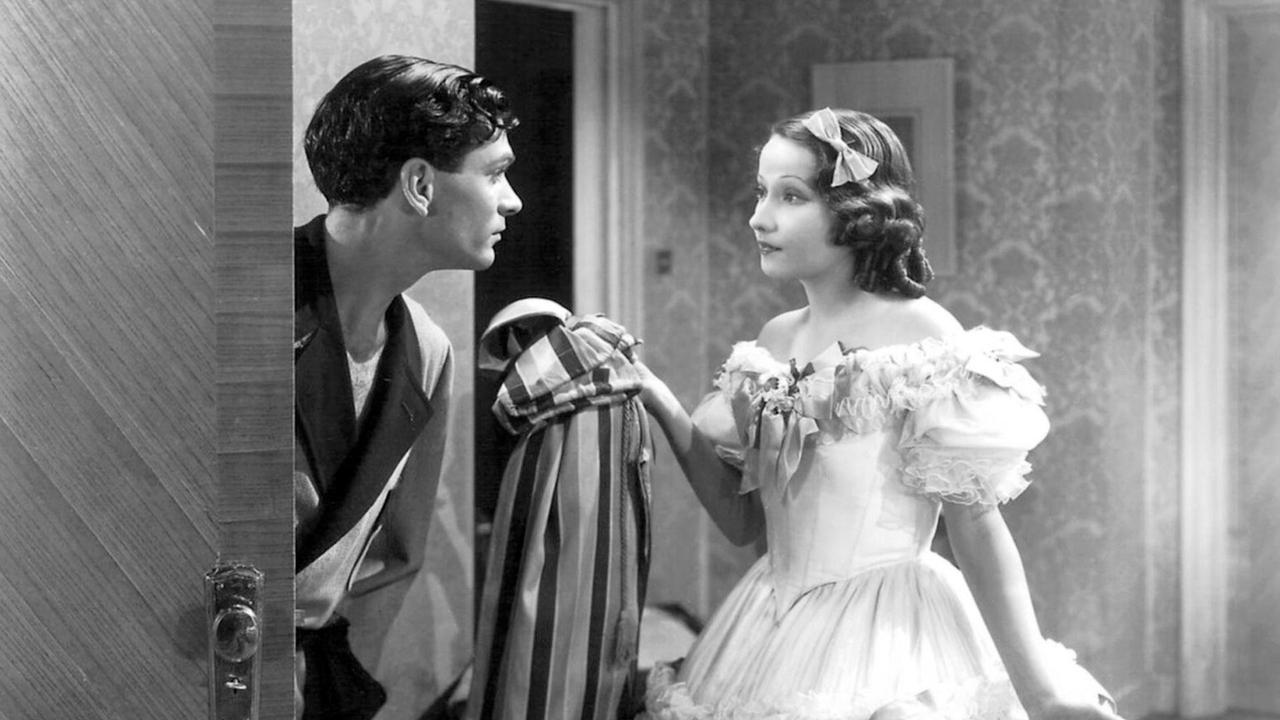Charles Herold (cherold)
Divorce of Lady X is a screwball comedy that captures the basic screwball formula but fails to be actually funny.Olivier plays the staid guy while Oberon plays the wacky dame who disrupts his life. This leads to mistaken identities and general chaos.It's a formula that worked great in Bringing Up Baby, but fails here. There are a number of reasons. The direction is static, often revealing its origins as a stage play. Olivier is stiff, and Oberon tries to hard in what was to become known many years later as the manic pixie role.While many screwball comedies take their time getting their stars from hate to love, Lady X jumps the gun. This is particularly problematic because Oberon's character is genuinely awful, manipulative and self centered, and she never achieves the charming playfulness necessary to make that seem cute. Meanwhile, Olivier is a bitter misogynist. And yes, terrible people can fall in love, but it's still not convincing here.The mistaken identity part is a good idea but is completely unpersuasive, requiring Olivier to be dumb as a box and Oberon to reach an almost sociopathic level of scheming.Screwball comedies rely on charm and chemistry, as in Bringing Up Baby or It Happened One Night. Here the leads have iffy chemistry (they did better later on with Wuthering Heights) and not a whole lot of charm (at least by American standards; perhaps charm just isn't a British thing?).Yes, it's got big stars, but it's an old creaky movie that simply isn't all that good.
Neil Doyle
This DIVORCE OF LADY X is the sort of film about misunderstandings among the upper crust of society that American audiences usually associate with someone like Norman Krasna, who wrote so many romantic comedies where someone assumed a different identity to keep the mistaken identity theme afloat for the duration of the plot. If I hadn't known better, I would have suspected he had a hand in this screenplay.Here we have an early comedy from the U.K., courtesy of Alexander Korda, making use of three strip Technicolor--very low-key color apparently, at least judging from the rather poor Public Domain prints I've seen.LAURENCE OLIVIER plays a barrister whose disdain for women is on a level with Professor Henry Higgins--he tolerates them until he falls in love with them. The joke here is that he is mistaken about the identity of MERLE OBERON, who gets even with him after finding out how rudely he treats women, by pretending to be the wife of RALPH RICHARDSON. He's hoodwinked by her until the very end when she realizes they share a mutual attraction.It's amusing to watch Olivier and Oberon tackle these lightweight roles only a year before joining forces again for WUTHERING HEIGHTS. He has some very scathing comments to make about the opposite sex and plays his role with gusto. She's a bit more restrained in her role but together they show the kind of chemistry they would also get to display in the William Wyler film the following year.This would have been more watchable if the color wasn't so badly in need of restoration.Summing up: Amusing comedy of manners among British aristocracy.P.S. - This is an update on my review of the film. Saw it today in brightly restored Technicolor which at least adds to the film's entertainment value, though the script is the main trouble. But TCM featured it in pristine condition in color that was extremely washed out and primitive looking before. It's now seen to advantage and adds a great deal of interest to viewing it as it was originally intended.
theowinthrop
Lawrence Olivier and Merle Oberon did two movies together within two years. One is considered one of the great romantic films of all time, and the movie that made Olivier a great movie star (and gave Oberon her best performance role): WUTHERING HEIGHTS. The other is this film, made in England a year earlier. THE DIVORCE OF LADY X is a romantic comedy (as WUTHERING HEIGHTS is a romantic tragedy). Olivier is a lawyer, Everard Logan, who is a dynamic barrister, but is also a total misogynist. One night he checks into a hotel just ahead of a crowd of people. It is a very foggy night (the type of pea soup fog that London was known for up until a notorious "killer" fog in the 1950s), and the crowd (who'd been attending a party in the hotel) need beds. The management tries to get Logan to allow one or two socialite ladies to sleep on a couch and a day bed in his rooms, but he refuses. But he has not reckoned with Merle Oberon as Leslie Steele. The granddaughter of a high court judge, she manages to get into Logan's rooms and manipulates him to not only agree to her sleeping there, but appropriates his bed (he goes onto the couch - much to his discomfort).The next day they share a breakfast, and in the smalltalk it is evident that despite his mistrust of women Logan finds Leslie very attractive. But she kittenishly refuses to tell him her name. She is determined to learn more about him, and she finds his attitude toward women infuriating. In the meantime, Logan is approached by a wealthy nobleman (Ralph Richardson as Lord Mere) as a potential client. Mere suspects his wife Lady Mere (Binnie Barnes) of having an affair. In fact, he tells Logan her Ladyship was with her lover in the hotel that Logan knows he was in on the night of the fog. Logan (naturally) jumps to the conclusion that Lady Mere was his mysterious roommate that night. I will not go into the plot any further, except to say that Leslie eventually realizes what a mistake Logan has made, and decides to use it to teach him a lesson about women.The script has the feel of a Wodehouse novel, but is slighter. Still the performances of Olivier, Oberon, Richardson, Barnes, and Morton Selden (as Oberon's grandfather) are all splendid. It shows what a good cast can do with even the slightest of materials. Take a look at some of the minor scenes to see what I mean: Selden's first scene, complaining about his weak coffee to his butler/valet, who tells him off properly (they've been used to each other's personalities for years). Or Olivier dealing with a young clerk in his office, who is certain there were two Lady Meres in the office two minutes before (there were, but Oberon and Barnes left together), and ends up thinking the poor clerk is a simpleton. Or the waiter in the hotel who can't understand why the tenant in Olivier's room is constantly changing from a man to a woman to a man. As I said, a slight charming comedy - but it is very charming.
Oct
The plot of "The Divorce of Lady X" is a silly confection of misunderstandings among the London upper crust which cries out for dance interludes by Fred and Ginger. We have the crusty grandfather, a judge, with an impertinent butler; the screwball granddaughter and the stuffy lawyer at whom she sets her cap; a dotty peer; a harassed hotel manager; the de rigueur beauty parlour scene; and the eclaircissement at a stately home where a hunt is meeting.That is almost the only non-foggy exterior in a story shot in Natalie Kalmus's three-strip Technicolor. It was in its infancy in the UK: luxury hotel suites and posh flats glow in soft, rich tones. (Olivier: 'Where shall we meet? Savoy, Embassy, Claridges?')Korda had got the British industry over the longueurs of early 'teacup drama' in talkies, and the film is quietly but fluently piloted by Hollywood's Tim Whelan. It is stagy neither in blocking nor in the delivery of lines, though the cast other than Oberon (Mrs Korda) are West End veterans.Merle is skittish and fretfully British, posing as 'the wickedest woman in the world'- 'four husbands in five years and two adventures'. Binnie Barnes as the genuine adventuress was one of Britain's first Atlantic movie commuters, and sounds American: her inclusion is Korda's nod to his partners in United Artists and the US market.But the film's fascination, Technicolor apart, is to watch Laurence Olivier on the brink of supremacy: his great voice plangent or whispering, his impatience poking through. It was his last light comic role (unless you count "The Prince and the Showgirl") and he can do it asleep. He is ready for his Hollywood purple patch and the transmogrification to Shakespearean king of Britflicks which would ensue. Here he's predominantly moody and reflective, or peppery. His court outburst against the hypocrisy of modern woman (see the post below for a verbatim transcript) seems heartfelt, however; it gains piquancy from our knowing what heartache Vivien Leigh would give him. Ralph Richardson's bumbling and havering are a good counterpoint to Larry's crispness.Miklos Rozsa, then 30, was a compatriot of Korda. His sprightly score includes Gershwin pastiches. He too would soon take off for Hollywood. Unlike Larry, he stayed there..


 AD
AD



